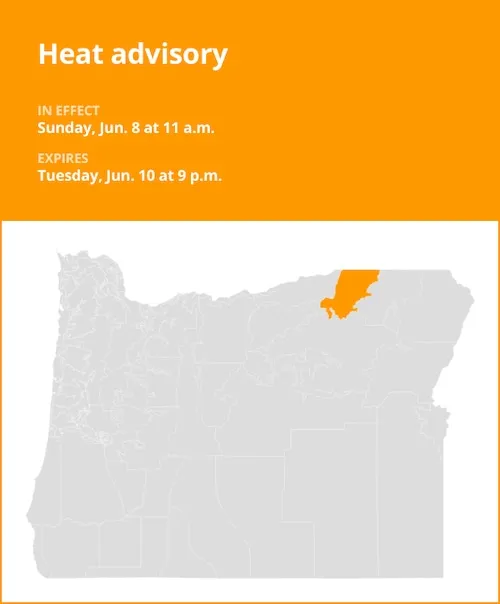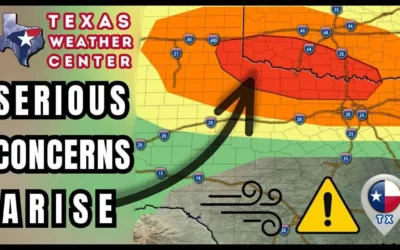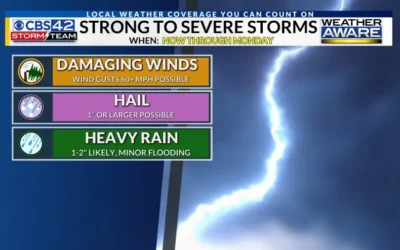Oregon Heat Advisory: Residents Urged to Prepare for Triple-Digit Temperatures
This weekend, residents of the Foothills of the Northern Blue Mountains of Oregon are bracing for a serious heatwave, as a heat advisory has been issued from Sunday through Tuesday. As temperatures are expected to soar into the triple digits, officials are advising the community to take necessary precautions to ensure safety during this extreme weather event.
Weather Forecast: What to Expect
The National Weather Service has warned that portions of the Rogue Valley will experience well-above-normal temperatures, with forecasted highs reaching over 100 degrees Fahrenheit. This intense heat will not only affect outdoor activities but will also pose health risks, particularly for vulnerable populations such as the elderly and those with pre-existing health conditions.
During the height of the heatwave, which is projected to last from Sunday to Tuesday, residents can expect minimal relief during the nights, with low temperatures remaining uncomfortably warm. With such conditions, it becomes imperative for residents to plan ahead in order to avoid heat-related illnesses.
Health Risks: Understanding the Dangers of Extreme Heat
Heat-related illnesses can range from mild conditions, such as heat exhaustion, to more severe situations like heat stroke. Symptoms of heat exhaustion include heavy sweating, weakness, cold and clammy skin, rapid breathing, and a weak pulse. Heat stroke is a more severe condition and can manifest through confusion, seizures, and loss of consciousness. If someone experiences these symptoms, it is vital to call emergency services immediately.
Oregon health officials are particularly concerned about at-risk populations. Young children, the elderly, and those with certain chronic medical conditions are far more susceptible to heat stress. Additionally, individuals who engage in outdoor occupations or activities must take extra precautions as they may be exposed to high temperatures for extended periods.
Safety Recommendations for Residents
In light of the upcoming extreme heat, health officials have compiled a series of recommendations for residents to follow:
- Stay Hydrated: Drink plenty of fluids, especially water, even if you don’t feel thirsty. Avoid alcohol and caffeine as they can contribute to dehydration.
- Limit Outdoor Activities: If possible, stay indoors during peak heat hours, typically between 10 a.m. and 4 p.m. If you must be outside, take frequent breaks in the shade and drink water regularly.
- Check on Vulnerable Neighbors: Make an effort to check in on elderly neighbors or those who may require assistance. Ensure they have adequate access to air conditioning and hydration.
- Use Fans and Air Conditioning: Keep your living space cool by using air conditioning or fans. If you do not have air conditioning, consider visiting public spaces where cooling is available.
- Wear Appropriate Clothing: Light and loose-fitting clothing can help keep your body temperature regulated. Avoid dark colors, which can absorb more heat.
- Know the Signs of Heat-Related Illness: Recognize the symptoms of heat exhaustion and heat stroke. If you or someone else is experiencing any symptoms, act quickly.
Community Resources Available
Local organizations and community centers are preparing to support residents during the heatwave. Cooling centers will be available in several locations, providing shelter from the heat. Additionally, the Oregon Department of Human Services is offering resources for accessing water, food, and health services. Residents are encouraged to reach out to these resources if they feel vulnerable during this extreme weather.
Conclusion: A Call for Vigilance and Preparedness
As the heatwave approaches, it is crucial that residents of the Foothills of the Northern Blue Mountains remain vigilant and prioritize their safety above all else. Preparation and awareness can significantly mitigate the risks associated with extreme heat. By following the recommendations from health officials and being proactive in safeguarding health, the community can navigate this weather event more safely and effectively.
As we look ahead to this blistering weekend, let us remember that our health is our most precious asset, and it is up to us to protect it.







